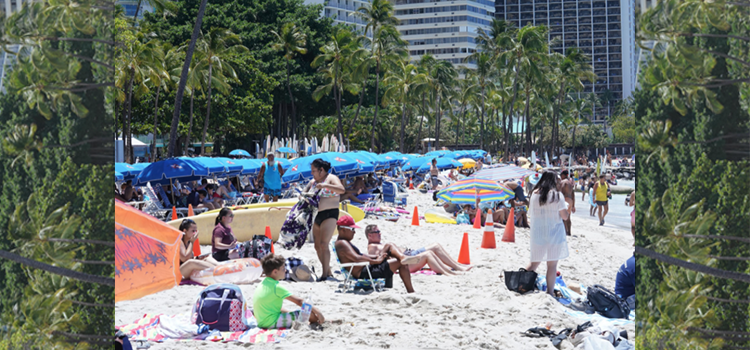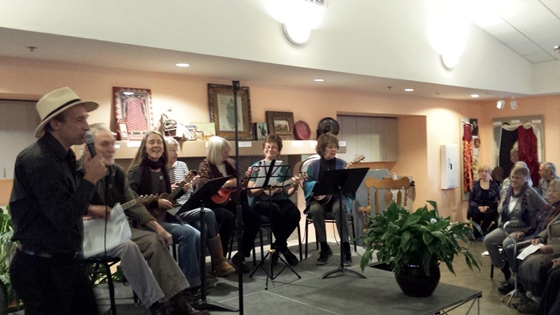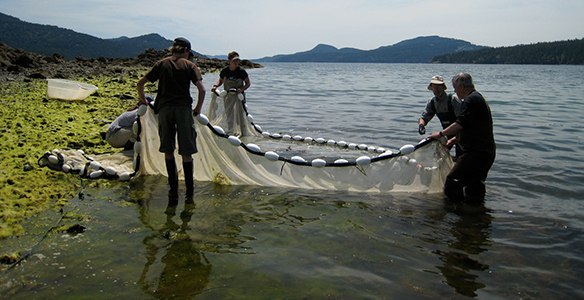Despite the many problems the massive summer surge of tourism has brought to Hawaii, plans to manage the tourism industry lack seriousness and urgency.
||| FROM CIVIL BEAT |||
For decades, the state and the visitor industry have seduced would-be tourists to buy plane tickets to Hawaii, book hotel rooms in the islands and spend money in local shops, restaurants and touristy activities. At times, that self-marketing has had a whiff of desperation when arrival numbers were down and other vacation destinations were trending.
In all that time, the image used to market Hawaii never matched the reality of Hawaii. Instead of the grunge and jangle of Nimitz Highway that greets tourists as they head out from the airport, it’s always empty beaches, magical (and totally safe) waterfalls, scenic hikes on lonely (totally safe) trails.

The problem with restricting tourism is that too many businesses have an economic interest in keeping it going. Cory Lum/Civil Beat/2021
Well, it worked. They bought it. That’s the image that everyone has of Hawaii. Add to that the carefully curated social media images of cliff-diving, seal-harassing and boozy beach bonfires and we have the current mess. They’re all here, standing in line for breakfast, breaking their ankles on hikes, taking over favorite beaches. Groups that used to hop on a party bus to Cancun are now sleeping on the floor in a Kihei condo or packed into a vacation rental in some formerly quiet neighborhood, and they are having a post-COVID-19 celebration even though we are, clearly, not post-COVID.
So now the Hawaii Tourism Authority is going to work to decrease the number of visitors coming to Hawaii.
Good luck with that.
The problem with any serious discussion of limiting the number of tourists is that it would mean some businesses don’t get to maximize their potential profit. Nobody, not a hotel chain or a tiny retail store, not the owner of a $8 million vacation rental or the person who subleases a room in their rental apartment through Airbnb, is going to agree to make less money, even if the good of the islands is at stake.
The other problem is pretending that there is any sort of control to be had over the current flood of tourists, especially if the action items being proposed include unserious things like increased interpretive signage and encouraging enforcement of current laws.
At least Hawaii is finally returning to using the word “tourists” instead of the more deferential and obsequious “visitors” or “guests.” That signals a more realistic view of the current situation.
These hordes were not invited. They showed up because the airlines were happy to sell them seats. At current numbers, the crowds that are streaming off the airplanes and packing local beaches are a couple of clicks closer to invaders. They’re not customers but consumers intent on experiencing their own definition of a good time.
A recent survey from the University of Hawaii Manoa Public Policy Center found that more than half of Hawaii residents queried want fewer visitors to the islands. Fifty-two percent of the 700 respondents “prefer limiting the number of visitors, with even stronger support among neighbor island and Native Hawaiian residents.”
Also significant in the findings, residents, by a 2-to-1 margin, said the state should control or regulate tourism more than other businesses, and support for regulating vacation rentals outside resort areas was almost 75%.
Hawaii residents are beyond frustrated.
READ FULL ARTICLE: www.civilbeat.org/?p=1453758&utm_source









“Well, it worked. They bought it. That’s the image that everyone has of Hawaii. Add to that the carefully curated social media images of cliff-diving, seal-harassing and boozy beach bonfires and we have the current mess.”
Like Hawaii, like here. It’s all about image, all in the marketing. The county (via the visitors bureau) sells nostalgia… tourism studies show that nostalgia is one of the number one things that draws people. A return to yesterday, to a simpler time and place, to a mellower, slower pace, to the good life. Over time, all this changing everything, and resulting in just the opposite. Everybody loses.
SJC Visitors Bureau 4/09/20–
Help Keep the San Juan Islands a Top Place To Travel!
One of the reasons the San Juan Islands receive great media attention is that the Islands often appear on “Top Places to Travel” lists. Please help us appear on the Conde Nast Traveler list by asking your satisfied customers to vote for the Islands HERE.
SJC Visitors Bureau 2019 Marketing and Management Report–
“Tourism is a top economic driver for San Juan County”
DESTINATION MARKETING & MANAGEMENT HIGHLIGHTS
We implemented the following destination marketing and management strategies to create awareness of the San Juan Islands brand, primarily targeting the growing Seattle area in order to put “heads in beds” and “feet on streets.”
Brand Positioning Statement – “The SJIVB helps people imagine and plan a getaway for themselves, and their family and/or friends, that will reconnect them to a quality of life where there’s breathtaking beauty, rich activities, and wonder and discovery encased in a soothing, rural, small-town atmosphere, where life feels a little slower paced and a little safer.”
San Juan Islands National Monument
Annual Manager’s Report — Fiscal Year 2016
Visitation in the San Juan Islands is estimated to be 1,000,000, occurring primarily in the months of May through September.
I appreciate you posting this article. I check Civil Beat most days for news, and parallel themes pertinent to SJC such as housing/VRs, food and questions about/ideas for our economy.
From SJI Visitor’s Bureau’s Action Alert–
Vote for Friday Harbor in USA Today’s Best Coastal Small Town in America
“There will come a day when all of us can pack our suitcases and head out on new adventures. Show your favorite islands some love! Vote for Friday Harbor in USA Today’s Reader’s Choice as Best Coastal Small Town in America. Friday Harbor has ranked in the top 5 on this list in previous years. Please vote every day until June 20th!”
“Vote Here”